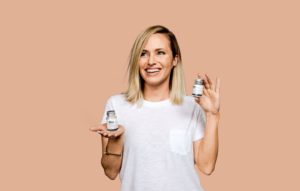In 2016, as Lindsay McCormick was working as a reality television show producer and catching a different flight every other week, it bothered her that she was going through countless travel-sized tubes of toothpaste. As a former surf instructor, she had unsettling memories of the plastic that littered the ocean and beaches where she taught lessons, and she wanted to avoid contributing to the earth’s waste.
McCormick conscientiously used refillable shampoo and conditioner bottles for her work trips, but the answer to the toothpaste quandary eluded her. She searched for alternatives, but everything on the market was packaged in plastic. Although she stumbled upon some toothpaste tablet options, the ingredients were lacking and reliant on harsh chemicals. And so McCormick started taking online chemistry courses on nights and weekends and talking to dentists and hygienists to formulate her own substitute.
It was a hobby—not a business. She simply wanted an effective toothpaste to combat her vegan lifestyle, as a high-carb diet tends to cause more cavities, and to reduce her own environmental footprint. At first, McCormick tried piping powders mixed with coconut oil to make hardened little balls like the candy dots that come on strips of paper, but that was a bust. Eventually, she landed on the right combination of ingredients, bought a $1,000 hand-press tableting machine and figured out how to package the toothpaste in a glass jar.

Lindsay McCormick, founder/CEO of oral care brand Bite
“I saw this solution, and I thought it would have an incredibly niche appeal. I assumed it would be me, some of my hippie friends, my parents—who are just always going to be supportive—and maybe some of my TV producer colleagues wanting this stuff,” McCormick says. “I figured it would be an Etsy shop, and I’d also sell it on Shopify with the goal of just making my money back from the equipment I bought.”
McCormick, now the founder and CEO of an oral care brand called Bite, was wrong. Case in point: “Shark Tank” investor Mark Cuban wanted a sizable stake in her fast-growing company and offered to finance it.
Like an increasing number of executives, McCormick discovered…
To get immediate access to the rest of this article—which includes an in-depth look at Bite’s growth, appearance on “Shark Tank,” marketing strategies and push for sustainable packaging—sign up for a free strategy membership using the “join for free” button below. If you’re already a member, please sign in.
Want to read more? Unlock Free Strategy Membership